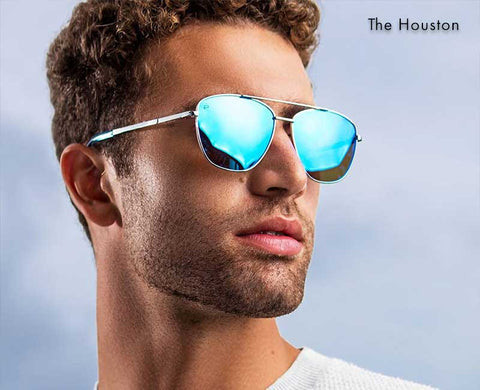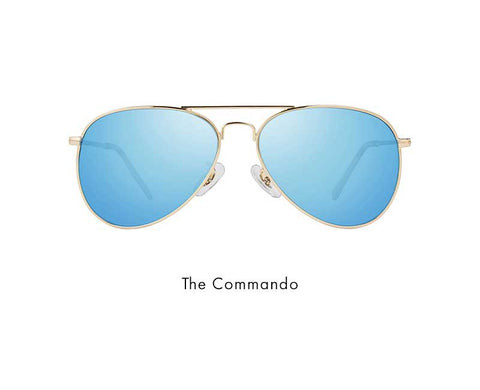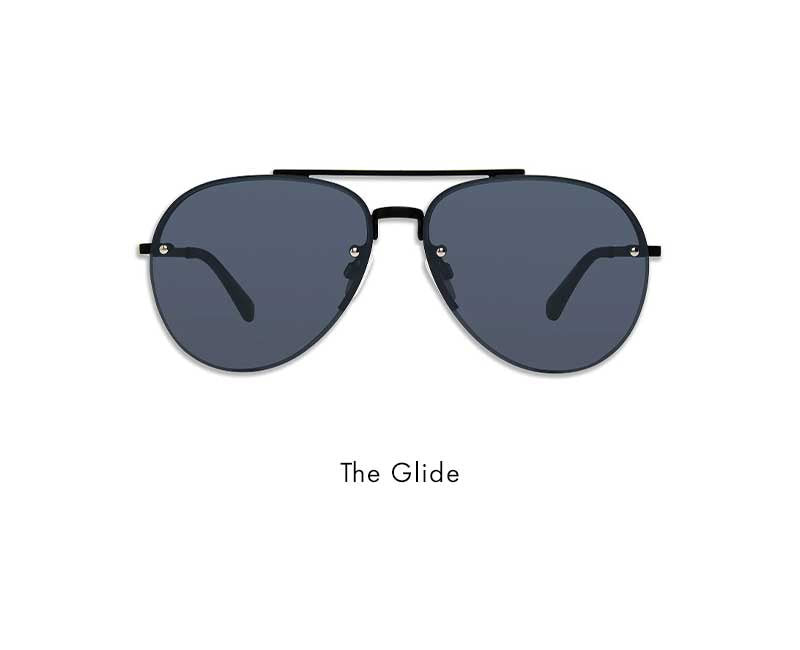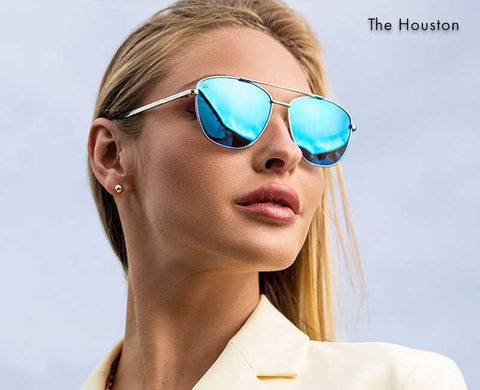Mirrored sunglasses offer style and eye protection, but can you wear them in uniform? At onlineuniforms.net, we clarify the rules for wearing mirrored sunglasses in different professional settings, ensuring you stay compliant and look professional. Check out our selection of uniform-approved eyewear and discover customized uniform solutions that meet your organization’s specific needs.
1. Understanding the Use of Mirrored Sunglasses
 Understanding Mirrored Sunglasses: A person wearing mirrored sunglasses reflecting the sky and surrounding buildings
Understanding Mirrored Sunglasses: A person wearing mirrored sunglasses reflecting the sky and surrounding buildings
Mirrored sunglasses feature a reflective coating on the lenses that reduces the amount of light entering the eyes, making them suitable for bright conditions. They provide enhanced glare reduction and UV protection, essential for eye health in intense sunlight. The reflective surface also offers a stylish and modern look, popular in both casual and professional settings.
1.1. How Do Mirrored Lenses Work?
Mirrored lenses function by reflecting a significant portion of light away from the eyes, decreasing brightness and glare. This is achieved through a thin metallic coating applied to the lens surface. This coating acts as a mirror, bouncing back sunlight before it penetrates the lens, reducing eye strain and improving vision clarity in bright environments.
1.2. Benefits of Mirrored Lenses
Mirrored lenses offer several key benefits:
- Glare Reduction: Minimizes glare in bright environments, enhancing visual comfort.
- UV Protection: Blocks harmful UV rays, protecting the eyes from long-term damage.
- Stylish Appearance: Provides a modern and fashionable look.
- Privacy: Offers a degree of privacy by concealing the wearer’s eyes.
1.3. Factors Affecting Lens Performance
Several factors influence the performance of mirrored lenses, including:
- Coating Quality: Higher-quality coatings provide better reflection and durability.
- Lens Material: The base material of the lens (e.g., polycarbonate, glass) affects clarity and impact resistance.
- Tint Color: Different tints enhance contrast and color perception in various conditions.
2. Can You Wear Mirrored Sunglasses in Uniform?
 Mirrored vs Polarized Sunglasses: Two sets of sunglasses, one mirrored and one polarized, showcasing their different reflective properties and use cases
Mirrored vs Polarized Sunglasses: Two sets of sunglasses, one mirrored and one polarized, showcasing their different reflective properties and use cases
Whether you can wear mirrored sunglasses in uniform largely depends on the specific regulations of your organization or profession. Many uniformed professions have strict guidelines regarding eyewear to maintain a professional appearance and ensure safety. Always check the specific guidelines of your workplace or institution.
2.1. Military Regulations
The U.S. military has specific regulations regarding the wear of sunglasses in uniform. According to the Department of Defense Instruction 670-1, sunglasses must be conservative in style and color. Mirrored lenses are often restricted due to their reflective nature, which can hinder communication and create a non-uniform appearance.
2.2. Law Enforcement Policies
Law enforcement agencies often have policies that restrict mirrored sunglasses. The International Association of Chiefs of Police (IACP) recommends that officers wear sunglasses that provide adequate eye protection without compromising their professional image. Mirrored lenses are generally discouraged because they can prevent others from seeing the officer’s eyes, which is important for communication and safety.
2.3. Medical Professionals
In the medical field, the primary concern is maintaining a professional and approachable demeanor. While there may not be strict rules against mirrored sunglasses, they are generally avoided. Clear or lightly tinted lenses are preferred to allow patients to see the caregiver’s eyes, fostering trust and communication.
2.4. Corporate Environments
Corporate uniform policies vary widely. Some companies may allow mirrored sunglasses if they align with the company’s brand and image. However, more conservative organizations often prefer employees to wear non-reflective sunglasses or clear lenses. It’s best to consult your company’s uniform policy or HR department for clarification.
3. Factors Influencing Uniform Policies on Sunglasses
 Mirrored vs Gradient Sunglasses: A comparison of mirrored and gradient sunglasses, illustrating the difference in light filtration and visual appeal
Mirrored vs Gradient Sunglasses: A comparison of mirrored and gradient sunglasses, illustrating the difference in light filtration and visual appeal
Several factors influence uniform policies on sunglasses, including safety, professionalism, and visibility. Understanding these factors can help you choose appropriate eyewear that complies with regulations and meets your needs.
3.1. Safety Considerations
Safety is a primary concern in many professions, particularly those involving outdoor work or hazardous environments. Sunglasses must provide adequate protection from UV rays, glare, and physical hazards. ANSI Z87.1 certification ensures that eyewear meets specific safety standards for impact resistance and optical clarity.
3.2. Professional Appearance
Maintaining a professional appearance is crucial in uniformed professions. Sunglasses should be conservative in style and color, avoiding overly flashy or distracting designs. The goal is to present a neat, uniform, and trustworthy image to the public.
3.3. Communication and Visibility
Effective communication relies on the ability to see and interpret facial expressions. Mirrored sunglasses can hinder this process by obscuring the wearer’s eyes. Policies often restrict mirrored lenses to ensure that individuals can communicate effectively and maintain clear lines of sight.
3.4. Compliance with Regulations
Uniform policies are often based on established regulations and guidelines. These regulations may come from government agencies, professional organizations, or internal company policies. Compliance is essential to avoid disciplinary action and maintain a consistent standard of appearance.
4. Alternatives to Mirrored Sunglasses
 Mirrored Sunglasses Benefits: Visual representation of the benefits of wearing mirrored sunglasses, including UV protection, glare reduction, privacy, and style
Mirrored Sunglasses Benefits: Visual representation of the benefits of wearing mirrored sunglasses, including UV protection, glare reduction, privacy, and style
If mirrored sunglasses are not permitted, there are several alternatives that provide similar benefits without violating uniform policies. These alternatives include polarized sunglasses, tinted lenses, and photochromic lenses.
4.1. Polarized Sunglasses
Polarized sunglasses reduce glare from reflective surfaces like water and pavement, enhancing visual clarity and comfort. They are an excellent choice for outdoor activities and driving, offering superior glare protection without the reflective appearance of mirrored lenses.
4.2. Tinted Lenses
Tinted lenses come in various colors and shades, providing customizable levels of light filtration. Gray, brown, and green tints are popular choices for everyday wear, offering good color perception and glare reduction. Tinted lenses are generally more acceptable in uniformed professions than mirrored lenses.
4.3. Photochromic Lenses
Photochromic lenses automatically adjust to changing light conditions, becoming darker in bright sunlight and lighter in low light. They offer versatile eye protection without the need to switch between different pairs of sunglasses. Photochromic lenses are a practical choice for individuals who work both indoors and outdoors.
4.4. Clear Lenses with UV Protection
For indoor environments or situations where sunglasses are not required, clear lenses with UV protection provide essential eye safety. These lenses block harmful UV rays without altering color perception or hindering communication. They are a simple and effective way to protect your eyes in any setting.
5. How to Choose Uniform-Compliant Sunglasses
Choosing uniform-compliant sunglasses involves considering several factors, including lens type, frame style, and color. Follow these guidelines to select eyewear that meets your organization’s standards and provides adequate eye protection.
5.1. Check Uniform Regulations
Always review your organization’s uniform regulations before purchasing sunglasses. Pay attention to specific guidelines on lens type, frame style, color, and any restrictions on reflective coatings. Compliance is essential to maintain a professional appearance and avoid disciplinary action.
5.2. Select Appropriate Lens Type
Choose a lens type that meets your needs and complies with uniform policies. Polarized and tinted lenses are generally safe alternatives to mirrored lenses, providing glare reduction and UV protection. Photochromic lenses offer versatility for varying light conditions.
5.3. Choose Conservative Frame Styles
Opt for conservative frame styles that align with a professional image. Avoid overly flashy or trendy designs. Classic frame shapes like aviator, rectangle, and round are generally safe choices. Ensure that the frames fit comfortably and securely on your face.
5.4. Consider Frame and Lens Color
Select frame and lens colors that are neutral and unobtrusive. Black, brown, and gray are popular choices for frames. Lens colors like gray, green, and brown provide good color perception and glare reduction. Avoid bright or neon colors that may violate uniform policies.
5.5. Ensure Proper Fit and Comfort
Proper fit and comfort are essential for all-day wear. Choose sunglasses that fit snugly on your face without pinching or slipping. Adjustable nose pads and temple tips can enhance comfort and stability. Consider lightweight materials like polycarbonate or nylon for extended wear.
6. The Importance of UV Protection
Regardless of the lens type or frame style, UV protection is paramount. Prolonged exposure to UV rays can cause serious eye damage, including cataracts, macular degeneration, and photokeratitis (sunburn of the cornea). Choose sunglasses that block 100% of UVA and UVB rays to safeguard your eyes.
6.1. Understanding UV Rays
UV rays are a form of electromagnetic radiation emitted by the sun. UVA rays can penetrate deep into the skin and eyes, causing long-term damage. UVB rays are more energetic and can cause sunburn and other surface damage. Both UVA and UVB rays pose a risk to eye health.
6.2. Risks of UV Exposure
Unprotected exposure to UV rays can lead to several eye conditions:
- Cataracts: Clouding of the eye’s lens, leading to impaired vision.
- Macular Degeneration: Damage to the central part of the retina, causing vision loss.
- Photokeratitis: Sunburn of the cornea, causing pain, redness, and temporary vision loss.
- Pterygium: Growth of tissue on the cornea, causing discomfort and vision problems.
6.3. Choosing Sunglasses with 100% UV Protection
Look for sunglasses labeled as providing 100% UV protection or UV400 protection. These sunglasses block all UVA and UVB rays, safeguarding your eyes from harm. Ensure that the lenses are made of high-quality materials that do not degrade over time.
6.4. Additional Eye Protection Measures
In addition to wearing sunglasses, consider these additional measures to protect your eyes from UV rays:
- Wear a Hat: A wide-brimmed hat can shield your eyes and face from direct sunlight.
- Avoid Peak Sun Hours: Limit outdoor activities during peak sun hours (10 a.m. to 4 p.m.) when UV radiation is strongest.
- Use Sunscreen: Apply sunscreen to your eyelids and surrounding skin to protect against UV damage.
7. Maintaining Your Sunglasses
Proper maintenance can extend the life of your sunglasses and ensure they continue to provide optimal eye protection. Follow these tips to keep your sunglasses in good condition:
7.1. Cleaning Your Lenses
Clean your lenses regularly with a microfiber cloth and a mild lens cleaner. Avoid using paper towels or harsh chemicals, which can scratch or damage the lenses. Gently wipe the lenses in a circular motion to remove dirt and smudges.
7.2. Storing Your Sunglasses
Store your sunglasses in a protective case when not in use. This prevents scratches, dents, and other damage. Avoid leaving your sunglasses in direct sunlight or extreme temperatures, which can warp the frames and damage the lenses.
7.3. Handling Your Sunglasses
Handle your sunglasses with care to avoid bending or breaking the frames. Use both hands when putting on and taking off your sunglasses. Avoid placing your sunglasses face down on hard surfaces, which can scratch the lenses.
7.4. Replacing Your Sunglasses
Replace your sunglasses if the lenses become scratched, damaged, or discolored. Scratches can impair vision and reduce the effectiveness of UV protection. Replace your sunglasses every two years, or as needed, to ensure optimal performance.
8. Purchasing Uniforms and Accessories at Onlineuniforms.net
At onlineuniforms.net, we offer a wide range of uniforms and accessories to meet your professional needs. Our products are designed for durability, comfort, and compliance with industry standards. Explore our selection of uniform-approved eyewear and discover customized uniform solutions that meet your organization’s specific requirements.
8.1. Wide Selection of Uniforms
We carry a diverse selection of uniforms for various industries, including healthcare, law enforcement, hospitality, and corporate environments. Our uniforms are made from high-quality materials that are durable, comfortable, and easy to care for.
8.2. Customizable Uniform Solutions
We offer customizable uniform solutions to meet your organization’s unique needs. Add your company logo, employee names, and other personalized details to create a cohesive and professional look. Our customization options include embroidery, screen printing, and heat transfer.
8.3. High-Quality Materials
We use only the highest-quality materials in our uniforms and accessories. Our fabrics are chosen for their durability, comfort, and resistance to wear and tear. We offer a variety of materials, including cotton, polyester, and blends, to suit different climates and working conditions.
8.4. Expert Customer Service
Our team of uniform experts is here to help you find the perfect uniforms and accessories for your organization. We offer personalized customer service to assist you with product selection, sizing, customization, and ordering. Contact us today to learn more about our uniform solutions.
9. Understanding ANSI Z87.1 Standards
ANSI Z87.1 standards are a set of safety requirements for personal eye and face protection devices. Compliance with these standards ensures that eyewear provides adequate protection against impact, dust, and other hazards. Understanding ANSI Z87.1 standards is essential for selecting appropriate eyewear for hazardous work environments.
9.1. What is ANSI Z87.1?
ANSI Z87.1 is a standard developed by the American National Standards Institute (ANSI) to establish performance criteria for safety eyewear. The standard covers various aspects of eye and face protection, including impact resistance, optical clarity, and coverage area.
9.2. Key Requirements of ANSI Z87.1
Key requirements of ANSI Z87.1 include:
- Impact Resistance: Eyewear must withstand high-impact forces without shattering or dislodging.
- Optical Clarity: Lenses must provide clear and distortion-free vision.
- Coverage Area: Eyewear must provide adequate coverage to protect the eyes and surrounding areas from hazards.
- Durability: Materials must be durable and resistant to wear and tear.
9.3. Marking and Identification
Eyewear that meets ANSI Z87.1 standards must be marked with specific symbols to indicate compliance. These markings include the manufacturer’s logo, the Z87.1 designation, and any additional markings for specific hazards, such as impact resistance or chemical splash protection.
9.4. Importance of Compliance
Compliance with ANSI Z87.1 standards is essential for ensuring worker safety in hazardous environments. Employers are responsible for providing appropriate safety eyewear and ensuring that employees wear it correctly. Failure to comply with ANSI Z87.1 standards can result in workplace injuries, fines, and legal liability.
10. Frequently Asked Questions (FAQs)
Here are some frequently asked questions about wearing mirrored sunglasses in uniform:
-
Are mirrored sunglasses allowed in the military?
- Generally, no. Military regulations often restrict mirrored lenses due to their reflective nature.
-
Can law enforcement officers wear mirrored sunglasses?
- Most law enforcement agencies discourage mirrored sunglasses because they can hinder communication and visibility.
-
Do medical professionals wear mirrored sunglasses?
- Mirrored sunglasses are typically avoided in the medical field to maintain a professional and approachable demeanor.
-
What are some alternatives to mirrored sunglasses for uniform wear?
- Polarized sunglasses, tinted lenses, and photochromic lenses are good alternatives.
-
How can I check my organization’s uniform policy on sunglasses?
- Consult your company’s uniform policy, HR department, or supervisor for clarification.
-
What is UV protection, and why is it important?
- UV protection blocks harmful ultraviolet rays from the sun, preventing eye damage such as cataracts and macular degeneration.
-
What are ANSI Z87.1 standards?
- ANSI Z87.1 standards are safety requirements for personal eye and face protection devices.
-
How do I clean and maintain my sunglasses?
- Clean your lenses with a microfiber cloth and mild lens cleaner, and store your sunglasses in a protective case when not in use.
-
Where can I purchase uniform-compliant sunglasses?
- Onlineuniforms.net offers a wide range of uniform-approved eyewear and accessories.
-
Can I customize my uniform with my company logo at Onlineuniforms.net?
- Yes, we offer customizable uniform solutions, including embroidery, screen printing, and heat transfer.
Ready to find the perfect, uniform-approved eyewear? Visit onlineuniforms.net today to explore our extensive collection and customize your uniform to meet your organization’s specific needs. Contact us at Address: 1515 Commerce St, Dallas, TX 75201, United States, Phone: +1 (214) 651-8600.
